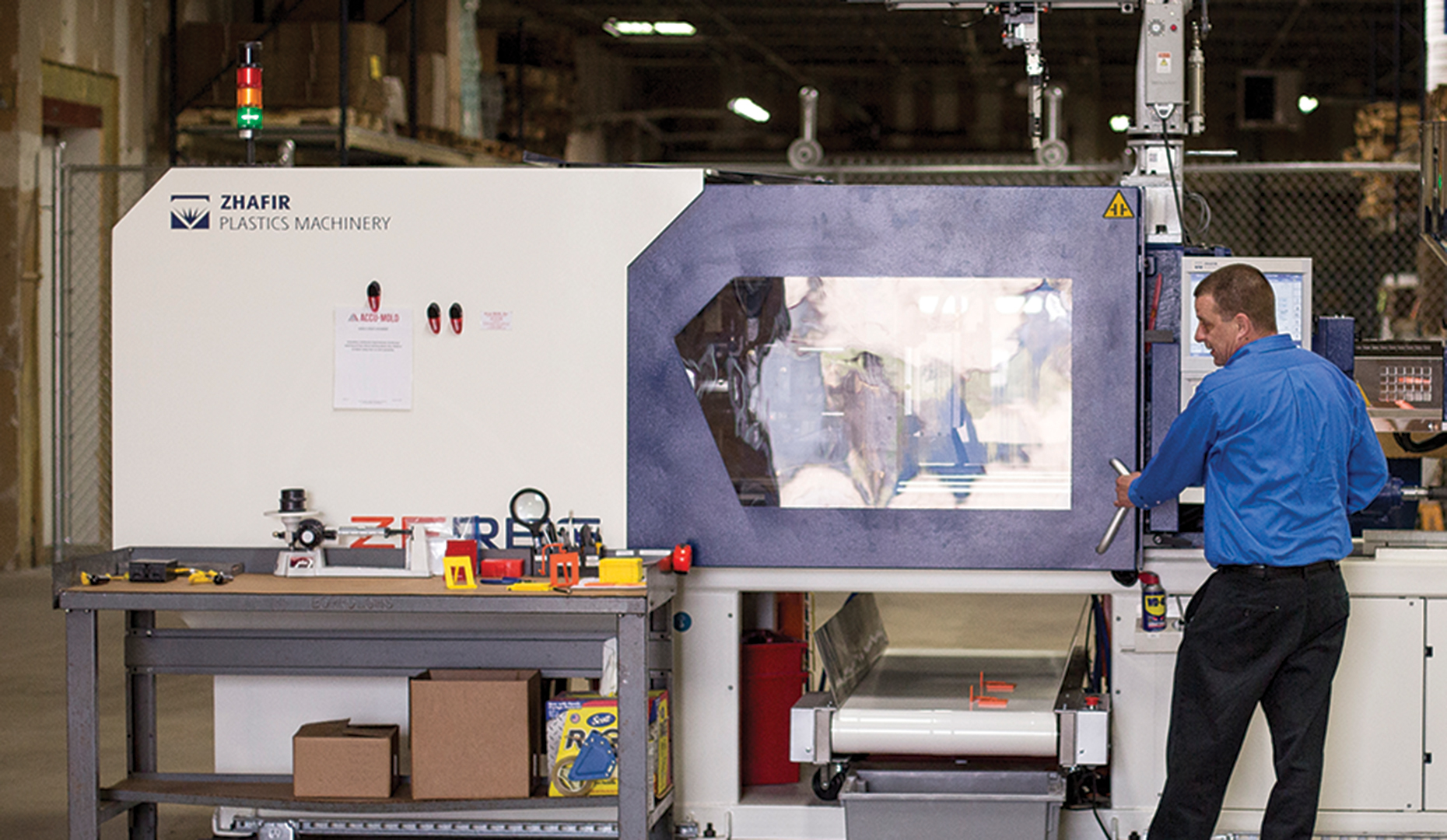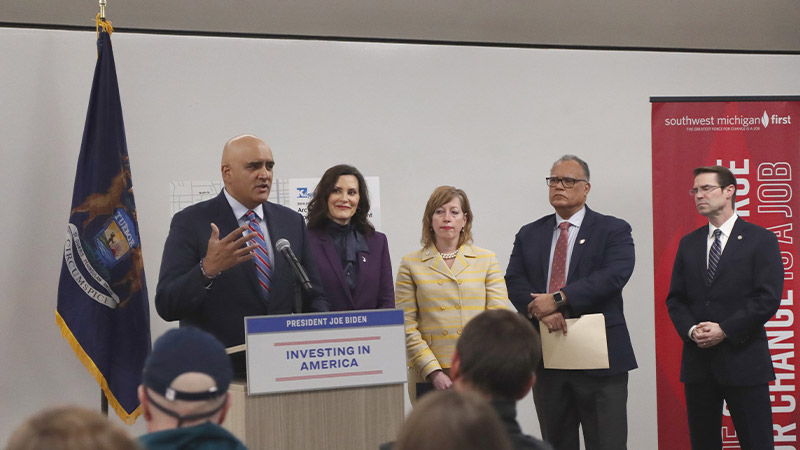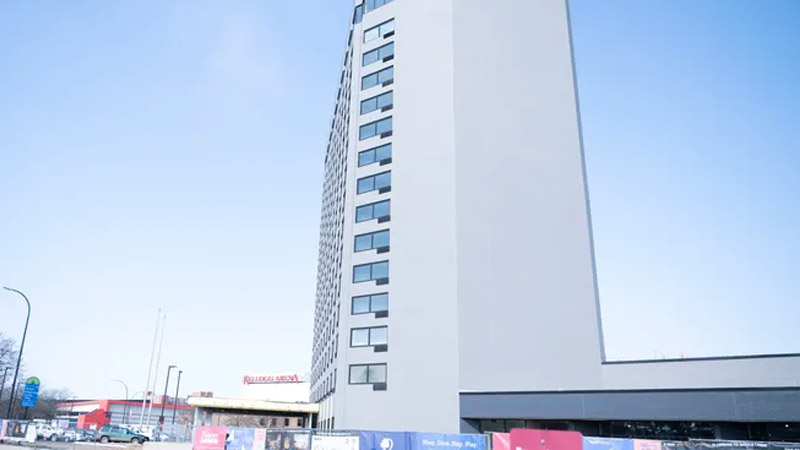Mno-Bmadsen and Accu-Mold give back by growing business and employment.
It has been said that when a major change occurs within a business’s world—like a change in ownership, leadership, or both—a good three to four years is needed for that change to settle in, settle down, and the company to evolve and thrive. It has been four years since Mno-Bmadsen of Dowagiac acquired Accu-Mold, LLC of Portage, and in that time, both organizations have navigated their set of sea-change the way a small ship tackles oncoming waves. They formulated a plan, sailed confidently forward, and overtook each new swell with all hands on deck. Now the two entities see themselves as family as much as business partners.
The investment enterprise of the Pokagon Band of the Potawatomi Indian tribe, Mno-Bmadsen (meh no-buh MOD sen) saw Accu-Mold—a plastic engineering, tooling and manufacturing company—as a safe but potentially transformative acquisition in 2013. It was the first company that Mno-Bmadsen would purchase with President and CEO Troy Clay at the helm. A careful scan of the Southwest Michigan business landscape told Clay and other Mno-Bmadsen advisors that there were solid trends upward in manufacturing investments. In Accu-Mold, founded in 1975 and purchased from then-owner, Dave Martin, the tribal group saw an opportunity to begin to advance the economic self-sufficiency of the Pokagan Band.
“Our mission (at Mno-Bmadsen) is to create strong businesses for future generations,” says Clay. “We’re really focused on developing wealth and business opportunities that will continue to grow and provide a diverse economy and employment for our people well into the future. To be successful, our first priority is to have successful businesses and run those well. That then generates opportunities not only for our people but also for our neighbors and, frankly, anybody in the Southwest Michigan area, because growth is not only for Accu-Mold and Mno-Bmadsen. When you’re growing, you have to pull in partners and work with other shops as part of that growth. The impact is not just on us; it can have a big impact on other shops in the region as well.”
Mno-Bmadsen found three of its investment criteria favorably and clearly evident in Accu-Mold when they considered making the full-service, plastic injection mold firm the first of the five diverse companies it now owns: Accu-Mold had been well-managed, it was fairly priced, and more value could be added once the tribal entity owned it.
In the first two years after the acquisition, change management was the focus as sales growth for the 20-employee company hovered between only two and three percent annually. The increase in sales was slower than desired but it was growth nonetheless. And Accu-Mold depended most on the automotive industry.
“In Michigan, you’re naturally going to do automotive work,” Clay reasons. “It’s at the baseline of what I call low-hanging fruit where we have good relationships with companies out of the automotive sector. But we needed to diversify at Accu-Mold.”
In 2015, an uptick toward double-digit sales growth occurred at the intersection of a new diversified business strategy and the hiring of a new president to make that strategy go. Dave Felicijan was brought in to lead Accu-Mold due to his experience with another minority-owned company that he helped grow from zero to over $50 million in sales. It, too, was a full-service injection plastic molding enterprise, not just a tool-maker and not just a molder, quite like Accu-Mold. Felicijan also knew how to utilize the Michigan Minority Business Development Council as well as the National Minority Business Development Council, especially when networking and securing new business.
“Our growth is going to come from diversifying into medical and defense sectors,” Clay clarifies. “The medical sector is huge, especially for throwaway plastic products which are extensively used in the medical industry. On the defense side, as a tribal-owned firm, we are minority-designated and it gives us some unique opportunities.”
When asked how much of Accu-Mold’s $5 million in annual sales comes from the automotive sector, Felicijan is quick to reply, “too much,” and then he specifies that it is about 80 percent reliant on automotive sales. The remaining 20 percent currently comes from the electronics, medical, and consumer goods realms. Felicijan sees non-automotive companies as the areas for the most growth for Accu-Mold, and his sales force has reached as far south as Georgia and South Carolina, as well as beyond national borders to Germany and Mexico, to garner new sales.
Right now, Accu-Mold’s two main facilities in Portage—an 8,000-square-foot engineering and tool-building center on Sprinkle Road and a 3,000-square-foot research and development building located nearby—can accommodate the business’s current growth. Clay, though, sees a future where expansion is not only projected but also inevitable.
“Based on feedback and the initial traction from our business development and sales effort, we have some potential for real growth soon,” declares Clay who meets with Felicijan about four to five times per month to talk strategy and receive updates. “We’re spending a lot of time right now on how we finance that growth, whether that be in a larger facility or acquiring more (manufacturing) equipment. We know substantial growth means making the investment to meet that growth.”
Sales growth obviously means workforce growth. You can’t have one without the other. Business does well by “going good,” in terms of business reports, yes, but mostly in terms of the way “it treats its employees and creates a culture of mutual respect, co-dependency, and trust.” That’s the way Felicijan sees it, anyway.
“A lot of times we can, any company can, get caught up in the ‘what’ and the ‘how,’ but the most important thing is to know the ‘why.’ Why do we do what we do?” Felicijan somewhat rhetorically asks. “That question is something we spend a lot of time concentrating on. Why are we here and why are we doing this? Obviously, it’s to make money, but we’re also here to employ people, most importantly tribal members, and start to retain our workforce instead of seeing some of these kids leave the area. We want to expand our technologies to be the best we can be for that workforce.”
To that end, Mno-Bmadsen started the Pathways Program, the human resource arm of the tribal enterprise that looks to employ and train any of its citizens wanting to establish a meaningful career, not only at Accu-Mold but also at one of four other diverse Mno-Bmadsen companies affecting local economies in three states. Its holdings include architecture and engineering with Seven Generations Architecture and Engineering located in Kalamazoo; civil engineering, land-use planning, environmental mitigation, and restoration services with WBK Engineering working out of Battle Creek; construction and mechanical contracting with D.A. Dodd headquartered in Rolling Prairie, Indiana and with an office in Benton Harbor; a C-store with Bent Tree Market in Dowagiac; and plastic molding with Accu-Mold. Each Mno-Bmadsen-owned company is committed to providing a stable, present, and promising future for those in the Pokagon Band, as well as others affected by these dynamic businesses in all of Southwest Michigan.
“I refer to our family of companies as a family for a reason,” explains Clay, whose leadership principles are biblically based. “Our businesses are like children, and I mean this in a respectful way. Each one is part of the Mno family because each one has unique attributes and characteristics that they bring to the table, both in terms of company leadership and what the company does. Accu-Mold affectionately has a real place in our hearts because they were our first acquisition.”
Since Mno-Bmadsen means “walking the good path,” Clay and Felicijan see no better way forward than when good people come together for the good of clan, culture, and community. Both men are extremely active in Southwest Michigan business and community groups. They don’t see it as a way of doing business as much as a way of living life.
“A successful company is only as successful as the community around it,” insists Felicijan. “We want manufacturing to be important in Southwest Michigan and Michigan as a whole. The tribe’s desire to give back to the community through both growth of business and employment is a top, top priority.”




